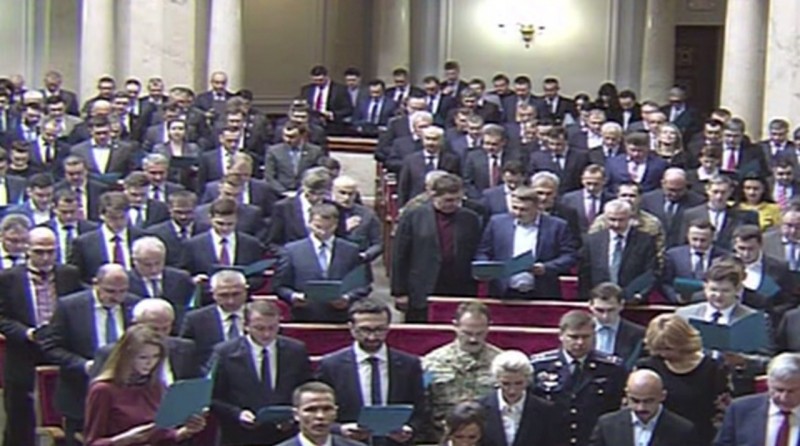
A screencapture of new Ukrainian Parliament members reading the oath.
A new Ukrainian Parliament gathered for its first plenary session on November 27, 2014. The Rada's 418 members were elected in the October 26 snap elections, the first to take place since the ousting of President Viktor Yanukovych, Russia's annexation of Crimea, and the beginning of a military conflict with Russia-backed separatists in two eastern regions.
Those elections took place according to a mixed electoral system: half the parliament's seats went to political parties that crossed the 5 percent threshold, and the other half went to single-mandate districts.
New parliamentary elections were one of the top demands by Ukraine's Maidan protesters—particularly after the tragic events of February 2014, when the demonstrators finally overthrew President Yanukovych, after significant bloodshed. Symbols from Maidan, especially reminders about the Old Regime's violence against protesters, were popular visuals in reports and campaign materials leading up to Ukraine's recent vote.
Ahead of the election, one of the main intrigues was whether Yanukovych's former allies—the people who supported Ukraine's short-lived “dictatorship laws” (so-called by Maidan protesters)—would make it into parliament again. Activists and journalists scrutinized candidates, closely monitoring campaigns and voting for violations. Despite these efforts, more than 30 percent of the MPs who supported the controversial laws (64 out of 239) were reelected to the parliament, this time mostly as independents, now unaffiliated with any political party.
The election also brings a great deal of new blood to the Rada. In fact, roughly half of the parliament's members are now first-term activists and journalists. There are even some soldiers in the incoming class, too.
New MPs include investigative journalists Sergii Leshchenko and Mustafa Nayyem, who authored a Facebook post that's widely credited with sparking the #Euromaidan protests, a “Self-Defense” activist who famously called for Yanukovych's resignation, several commanders of volunteer battalions engaged in the ongoing conflict in Donetsk and Luhansk, and others.
English-language Ukrainian blogger Taras Revunets drew attention to one of the new MPs, Nadiya Savchenko, a Ukrainian air force pilot taken prisoner during fighting in Eastern Ukraine and currently jailed in Russia:
Nadiya #Savchenko sworn in as a member of #Ukraine‘s parl(in absentia). She's a #Ukrainian POW held in #Russia.#рада8 pic.twitter.com/4OabBUGoji
— Ukrainian Updates (@Ukroblogger) November 27, 2014
Commenting on the presence of volunteer battalions’ members and commanders in the new parliament, Civil Network OPORA tweeted:
Нові депутати ходять не лише в костюмах #рада8 pic.twitter.com/cwTKSzS1D9
— Civil Network OPORA (@opora) November 27, 2014
New MPs don't only wear suits. #рада8
Kharkiv-based Twitter user Nikita Fatin called attention to the reelection of many members of Yanukovych's “Old Guard,” such as Oleksandr Vilkul, a former deputy prime minister. Referring to activists who, ahead of the October election, forced politicians accused of corruption into dumpsters, Fatin tweeted:
А для Вилкула в президию поставят мусорный бак? #рада8
— Nikita Fatin (@NikitaFatin) November 27, 2014
Will they put a dumpster in the presidium for Vilkul? #рада8
Others marveled that “anti-terrorist” battalion commanders and Kremlin-bogeyman Dmytro Yarosh, leader of the nationalist group “Right Sector,” will now share seats in a parliament with Yanukovych's former allies. Kharkiv-based activist Igor Zubkov had some fun with this concept, tweeting a photoshopped image of Right Sector figures threatening to punish the MPs who supported Yanukovych's infamous “dictatorship laws.”
Руку 16 января поднимал? Ходи сюда! #Украина #Рада8 pic.twitter.com/8FR6s5U0av
— Igor Zubkov ㋡ (@IgorZ_ua) November 27, 2014
Come here! Did you raise a hand on January 16 [to support the “Dictatorship Laws”]?
On her Facebook wall, journalist Irina Makarchuk summed up the curious composition of the new parliament:
Кстати, итог первого заседания #рада8 : военная часть, ньюзрум, коррупционеры, активисты и юля! #НоваРада ))
By the way, an outcome of the first session of [the Parliament of 8th Convocation]: the military unit, the newsroom, the corrupt ones, the activists and yulia (Yulia Tymoshenko – GV)! #НоваРада ))
As all sessions of the Rada are broadcast live on a designated television channel, singer-songwriter and activist Oleksandra Koltsova commented on the possible twists of such a “TV show”:
Включила в список продуктів на тиждень попкорн і валідол #НоваРада
— kasha saltsova (@kashasaltsova) November 27, 2014
[I] have included popcorn and validol [a popular anti-anxiety agent] on this week's list of groceries #НоваРада
Given the Rada's striking new political diversity, the first session was bound to begin controversially. As it happens, the Constitution requires the oldest serving MP to be the one to swear in the new parliament, leaving the task to Yukhym Zvyahilsky, a contentious figure in Ukrainian politics. A supporter of the “dictatorship laws” and the pro-Russian separatists in the East, Zvyahilsky was an awkward person to ring in the new Rada, and many opposed the idea of letting him do it. Ultimately, lawmakers reached a compromise, having all MPs read the oath aloud simultaneously.
Kyiv-based journalist Nastya Stanko commented on the ceremony:
Звягільського навіть не показали. Присягу фактично читав Турчинов #рада8
— Nastya Stanko (@StankoNastya) November 27, 2014
Zvyahilsky was not even shown [during the broadcast]. The oath was practically read out by [former Rada Speaker] Turchynov.
In the meantime, Hromadske.tv tweeted a photo depicting representatives from AutoMaidan (a movement within Euromaidan) gathered outside the Parliament Building, assembled to remind MPs of the heightened public scrutiny that awaits them in their new positions:
Під стінами парламенту вишикувався Автомайдан. #рада8 pic.twitter.com/xk7kd7ttlq
— Hromadske.TV (@HromadskeTV) November 27, 2014
Automaidan has lined up outside the parliament's walls. #рада8
Blogger Taras Revunets echoed a popular public sentiment, recalling the hopes many Ukrainians place on the new legislative body and the high stakes ahead:
#Ukraine‘s newly elected parl is sworn in. Hope u guys do a better job. Good luck! We'll be watching you. #рада8 pic.twitter.com/XwFcokMdOd
— Ukrainian Updates (@Ukroblogger) November 27, 2014







2 comments